
Pastor Saeed Abedini, a resident of Idaho, is among five Americans who were released by Iran last month as part of a prisoner swap between both countries. Abedini was detained in September 2012 for allegedly compromising national security by indulging in Christian proselytization before being sentenced to eight years in prison the following year.
After being held and beaten in Iran for refusing to renounce his Christian faith for over three years, Abedini’s wife finally told her children that their father was returning home last month.
“They were just excited. They couldn’t believe it,” she said after news broke that her husband was on a flight back to the United States from Tehran.


The prisoner swap was an important part of a much broader deal that saw America lifting $100 billion of economic sanctions on Iran in exchange for the latter curbing its nuclear program.
American President Barack Obama praised the release of Abedini and other Americans, saying it represents the conclusion of years of behind-the-scenes negotiation on the part of the United States.
“Several Americans unjustly detained by Iran are finally coming home. In some cases these Americans faced years of continued detention. And I’ve met with some of their families. I’ve seen their anguish, how they ache for their sons and husbands. I gave these families my word — I made a vow — that we would do everything in our power to win the release of their loved ones. And we have been tireless,” the president said, adding that their families “finally got the news that they had been waiting for.”
Abedini was born and brought up as a Muslim in Iran until he converted to Christianity in 2000. He was reportedly beaten viciously for refusing to renounce his Christian faith during his imprisonment.


In fact, Nagmeh read out from a letter in September last year, wherein her imprisoned husband offered reassurance to their 8-year-old daughter, saying Lord Jesus Christ was in control and urging her to learn important life lessons during such trying times because everything happens for a reason.
After his return, Abedini’s release was celebrated at an event honouring religious liberty.
“Thank God! We celebrate with Nagmeh Abedini on the release of her husband, Pastor Saeed Abedini,” said Tony Perkins, president of Family Research Council, who was leading a four-hour event in honor of National Religious Freedom Day on January 16.
Washington Post correspondent Jason Rezaian was also released as part of the prisoner swap after being held for over 543 days on grounds of espionage and related charges.
“We are relieved that this 545-day nightmare for Jason and his family is finally over,” Washington Post publisher Frederick J. Ryan said in a statement.
Former United States Marine Amir Hekmati was also freed.
“It is hard to put into words what our family feels right now,” Hekmati’s family said in a statement.
Two others, including Matthew Trevithick and Nosratollah Khosravi-Roodsari were also part of the same exchange.
“Their cases were largely unknown to the world. But when Americans are freed and reunited with their families, that’s something that we can all celebrate,” Obama said.
However, a sixth American, namely Robert Levinson, is still believed to be in Iran. A retired FBI agent and CIA contractor, Levinson was abducted in 2007 from Iran’s Kish Island. Even though Iran has repeatedly denied having anything to do with Levinson’s sudden disappearance, his whereabouts continue to be a sticking point between both countries.
“We still don’t see Levinson coming home, so we have unfinished questions and business still,” said former Secretary of State Hillary Clinton, who is now a Democratic presidential candidate.
In December 2015, International Christian Concern reported that another pastor Farshid Fatih had been released from a prison in Iran. The charges leveled against Fatih were similar to what several Christian converts in Iran face when they decide to meet others who share their religious beliefs.
According to local media reports, “He had been sentenced to six years in prison for action against the security of the state, contact with foreign organizations, and religious propaganda.”
Such charges are often used to provide a criminal element to what is theoretically legal under Iranian law but in practice, may be the cause for dozens of arrests, according to ICC. Over 90 Christians are still believed to be serving prison sentences in Iran.
Photo Credits: American Family Association
